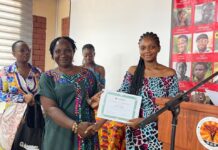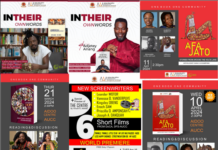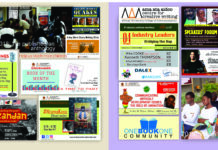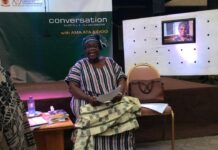STORY By Ukah Favour Chiamaka & Aidoo Centre Staff Writer PHOTOS by Patricia Gyamfi
Adabraka ACCRA. November 24, 2022: At African University College of Communications second TABON festival for arts and culture the Ama Ata Aidoo Centre for Creative Writing launched it’s fourth anthology of stories and poems.
The “Untold Stories Vol.I” is the fourth anthology edited and published Nana S. Achampong, himself an author and lecturer at African University College of Communications. The book is a collection of short stories and poems written by various students of African University College of Communications, Ghana Institute Of Journalism and Accra Technical University. Out of the many submissions received by the AAA Centre only nine stories and six poems were picked.
 The Ama Ata Aidoo Centre’s first nationwide call for submission in February 2028 was for stories about living in the southernmost part of Ghana which resulted in the “Adabraka: Stories from the Center of the World” anthology. The second anthology, “Larabanga: Short stories from The Sanannah” was compiled from a call for submission on stories from the Savannah region up North. The third anthology, “The lockdown: Creative non-fiction about living with Covid-19”, was a collection of submissions about life during lockdown in Ghana following the spread of the Covid-19 pandemic.
The Ama Ata Aidoo Centre’s first nationwide call for submission in February 2028 was for stories about living in the southernmost part of Ghana which resulted in the “Adabraka: Stories from the Center of the World” anthology. The second anthology, “Larabanga: Short stories from The Sanannah” was compiled from a call for submission on stories from the Savannah region up North. The third anthology, “The lockdown: Creative non-fiction about living with Covid-19”, was a collection of submissions about life during lockdown in Ghana following the spread of the Covid-19 pandemic.
Nana S. Achampong, the anthologist for the “Untold Stories Vol.I” and Director of Ama Ata Aidoo Centre for Creative Writing urged avid readers to continue exploring the vast world of books and for writers to keep on writing and not miss an opportunity to respond to calls for submissions to have their stories published.
The Ama Ata Aidoo Centre for Creative Writing is located at African University College of Communications, Off Kojo Thompson road, Adabraka, Accra.
Launching the book, the Queenmother of Adabraka Naa Korkor Aadzieoyi I said this anthology is “unique because it is populated by submissions from students. It is also unique because it features some poetry. Most interestingly, it brings together writings from students from different colleges: it is after all a collection of short stories and poems by students from African University College of Communications, Ghana Institute of Journalism and Accra Technical University”.
The new authors are Nahnah Afi Dede LANGMER (Dead men tell no tales), Khadija Williams (Drama of Hypocrisy), Ruth Aryeh (Matters of The Heart), and Appiah Kofi GRAHAM (Dreams). The rest are Angelique Heymann Apedo (End of the Road), Innocence WORD (Voiceless) and the sensational story teller Caris Adjei LONDON (Hidden). Contributing poets are Vanessa Okialey Vanderpuye, Emmanuella Otoo, Andrew Adeshina and Regina Dadson.
Exciting new writer Ursula M. Abanga was also kind enough to donate her new piece “The Day Sparky Came Home” to the collection.

As should be expected, editing was sometimes invasive, but the editorial board went through the process with the integrity of each work as key; the voices and styles are the authors’. The editorial board particularly had to go deep on the GIJ submissions because they were originally written for the school’s book project and they had to be repurposed for this anthology. Much thanks to David Apau, the man in charge of GIJ’s creative writing program, whose department submitted stories for the board to choose from.
In February 2018, the #AidooCentre made a nationwide call for submissions of short stories for its pilot anthology about living in the southernmost parts of Ghana. Before the March 31 deadline, the Centre was inundated with submissions of such high quality that my expectations as an anthologist were blown asunder. This made it necessary to bring on board a few more littérateurs to assist in the shortlisting and editing processes. In August 2018, that collection was launched as Adabraka: Stories from the Centre of the World. The work by 14 new writers was received very well, and NAFTI actually turned Hunu Bi, Mercy Addai’s contribution, into a short for national television.
In December of the same year, the Centre made another call for stories, this time from the savannah regions up north. The criteria used in deciding were many, but basically all pieces had to be well thought through and in line with our guidelines. Of course, consideration was given to writers who live or are from the region, and females in particular to foster some balance in representation. On Monday June 24, 2019, Larabanga: Short Stories from the Savannah was launched at the Discovery House Forecourt in Adabraka, ushering in 22 more new writers onto the nation’s literature scene with stories that covered the breadth of the complexities that make up the savannah sensibility, if there is such a notion as that. The literary editors (editorial board) had to agree that each of the final 22 showed great writing skills and understanding in content, created fantastic imagery, and evoked many complex emotions.
Based on the successes of Adabraka: Stories from the Centre of the World and Larabanga: Short Stories from the Savannah, the #AidooCentre prepared itself for its third regional anthology: a call for stories from the Volta Region. However, COVID-19 happened, and everything shut down. From March 2020, the nation was placed under a lockdown. And so the #AidooCentre altered its focus; it invited writers to submit original experiences during the period of COVID-19 stay-home isolation in the form of short stories for an anthology to be called ‘Lockdown’. All styles and sub-genres including humor and stories with experimental narratives were welcome, but they had to be creative nonfiction. The submission guidelines suggested that all entries be between 500 and 5,000 words. Admittedly, the initial response was so disappointing we had to extend the deadline, twice. In all, the call received 136 entries out of which 16 authors were shortlisted for this collection – The Lockdown: creative nonfiction about livid with COVID-19.
The dominant theme underlying The Lockdown anthology was the anxiety brought on by news of the pandemic. Each story was however presented as an account of strong characters in challenging circumstances that employ novel ways to triumph and celebrate the uniqueness of their situation. There was humor in the face of adversity as was expressed in Arthur’s Dear Diary, ijahra larry’s Pilolo, Apiah’s Lockdown story, and Agudu’s Fellow Ghanaians; there were epiphanies of simple pleasures in Wood’s Small Talk, Ofori-Acquah’s Transitions and Obeng- Koranteng’s That Secret Place. Faith was found in Taylor’s We’ve come this far and Abraham’s Grace isn’t afraid. And there wass gratitude in Miho Boateng’s Thank you, Andoh’s Twin Butterflies, Ako-Noi’s O Awuradze, and Lawrencia Owusu’s Answered Prayer. Running through all though was a thick strand of strong resolve and balance as is exemplified in Bruce Ofei’s Year of the rat and Erskine’s Grief.
It is with much joy that the #AmaAtaAidooCentre presents the word with this fourth corps of incredibly independent new short story writers.
The project was made possible by #AUCC@20, #TabonFestival2022, AUCC-CfCA and the Ama Ata Aidoo Book Society at AUCC.
This anthology is dedicated to the lady in whose name this Centre is established: Ama Ata Aidoo. May you continue to inspire generations of story tellers with your craft and direction.
It is made possible because of the combination and focusing of many different efforts. The #AidooCentre is grateful to all for the different levels and types of support. In particular, it acknowledges the following without whom nothing would have started in the first place: AUCC Founder Hon. Kojo Yankah, former AUCC President Dr. Koryoe Anim-Wright, current AUCC President Prof. Abeku Blankson, Discovery House Third Floor (Registry, Finance, Estate and Security), Prof. Ama Ata Aidoo, #AidooCentre Interns, our indefatigable archivists and publicists, and the regular members who attend our events.
Thanks also go to David Apau, in charge of GIJ’s creating writing program, who submitted stories from the board to choose from.
For all those who continue to support us in various ways – Adabraka Queenmother Naa Korkor Aadzieoyi I, Henry and Jane Abraham, Hajia Fauzia Hudu (Casta Diva Foundation), the volunteers at www.afronovaradio.com and all the patrons too many to name here – you know yourselves, and you know the love we have for you in return.








